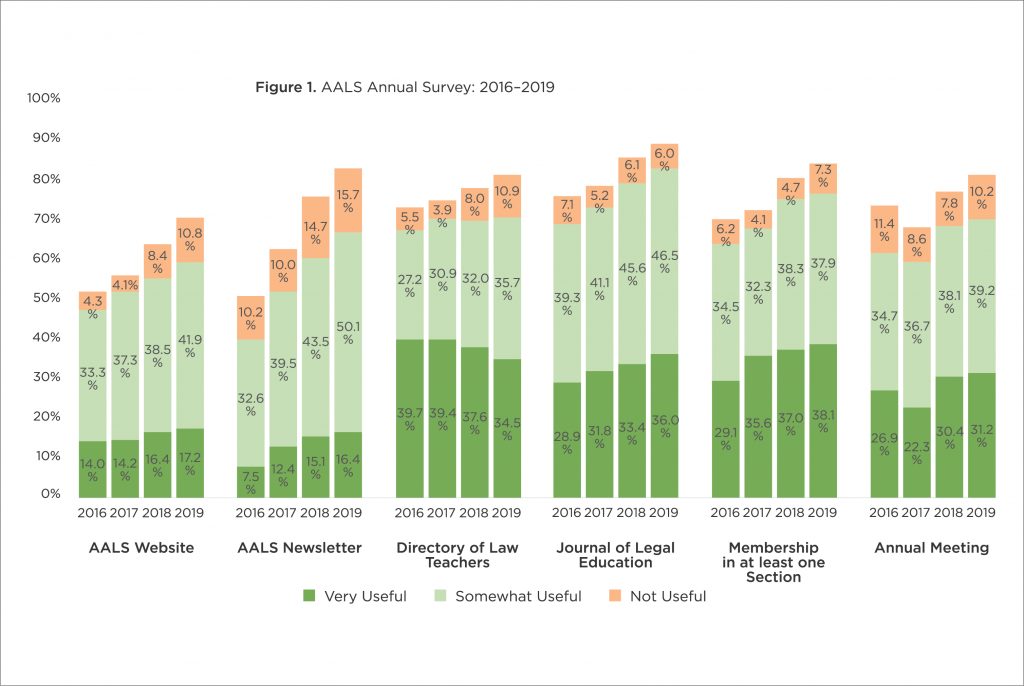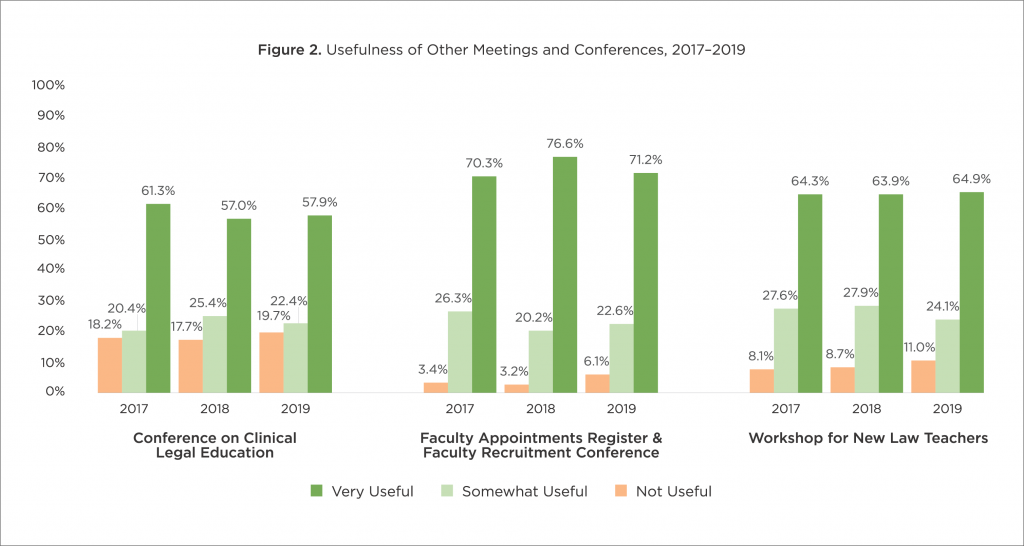The results of the fourth annual AALS Annual Survey are consistent with those from 2018. The Journal of Legal Education (JLE), membership in at least one AALS Section, the AALS Annual Meeting, and the Directory of Law Teachers were most often rated as very or somewhat useful. While there was a slight increase in usefulness of the Journal of Legal Education, the other three resources were on par with last year’s results. The AALS website and AALS News also showed an increase in usefulness over 2018.
More than 82 percent of respondents reported that the JLE is somewhat or very useful, about three percentage points more than in 2018. Capitalizing on the successful 2018 effort to “go green” and print fewer paper copies of the journal, (which resulted in a 40 percent reduction in the number of hard copies printed) AALS will again invite member schools to indicate how many hard copies of the publication they would like to have delivered. Meanwhile, the journal remains accessible online, and the JLE website serves as a searchable repository for current and past issues and includes subscription and submission information.
If you have any questions about the JLE, please contact AALS.
AALS Sections continue to be rated as useful by most law school staff and faculty with 76 percent of respondents reporting membership in at least one section as very or somewhat useful. This is consistent with the three-quarters of respondents who rated section membership as useful in 2018. AALS has 103 sections which, in addition to planning the majority of programming at the AALS Annual Meeting, provide forums for law school faculty and staff to engage around specific areas of expertise year-round.
To encourage more section membership, AALS staff have focused on simplifying the process of joining sections both online and in-person.
In fall 2018, invitations sent to prospective section members resulted in over 600 new section memberships. Additionally, monthly new member reports now provide section chairs with a list of faculty joining their sections as a way to encourage further engagement. Over the past year, section membership has increased 1.7 percent and now is over 43,000. AALS has introduced new web tutorials and revised resources to better assist section leaders in their roles, and section activities and communications continue to improve through section discussion lists, newsletters, and programming for the AALS Annual Meeting.
Questions about Sections or want to join? Contact AALS Sections.

As the association’s flagship conference, the AALS Annual Meeting continues to be one of the most meaningful opportunities for law school faculty and staff to connect with and learn from colleagues. Seventy percent of this year’s respondents rated the meeting as very or somewhat useful, compared with 69 percent of 2018 respondents and 59 percent of 2017 respondents. Recent enhancements to the meeting include new types of sessions such as small discussion groups, better information on how to submit program proposals, and a 50 percent discount for new or retired faculty.
The Directory of Law Teachers (DLT) remains a valuable resource for law faculty. Seventy percent of respondents to the 2019 AALS Annual Survey indicated that the DLT is very or somewhat useful, which is nearly the same as in the 2018 survey. Nonetheless, almost 3 percent of respondents reported that they were unaware of the DLT as a resource, and about 16 percent said they do not use this resource.
Did you know? The Directory of Law Teachers is available online for faculty and deans to update their profiles. The online version of the DLT is also searchable by name, school, subjects taught, and tenure status. Faculty members in the DLT can adjust their privacy settings to specify what information they would like to have displayed online.
Update your profile at dlt.aals.org. For questions, please email DLT Support.
AALS holds several meetings throughout the year to provide additional support and resources for specific groups: the annual Conference on Clinical Legal Education, the Faculty Recruitment Conference, and the Workshop for New Law Teachers. Because these meetings are for specific audiences, many survey respondents indicated that they do not use these services. A closer look at
these data (see Figure 2) reveals more about the usefulness of those meetings.
Of the 290 respondents who rated the Conference on Clinical Legal Education, 58 percent indicated it was very useful. This is a very slight increase from 2018, but still lower than the 61 percent of respondents who rated it very useful in 2017. Of the 570 respondents who rated the Faculty Appointments Register and Faculty Recruitment Conference, 71 percent said they were useful, up from about 70 percent in 2017 but down slightly from 2018. And lastly, of the 353 respondents who rated the Workshop for New Law Teachers, almost 65 percent said it was very useful, on par with this result from the past two years. Again, respondents who rated these more targeted meetings did not necessarily attend in the past year, so these data should be interpreted more broadly rather than as evaluations of 2018 conferences specifically.

The 2019 AALS Annual Survey was conducted in March and April. A brief online questionnaire was distributed to deans, faculty, and staff faculty at AALS member and fee-paid law schools asking them to rate the usefulness of nine AALS member services. This year’s survey was similar in structure to the 2016, 2017, and 2018 AALS Annual Surveys, the response rate was lower than the 2018 rate. The 2019 survey yielded 811 responses, compared with 1,219 in 2018, 660 in 2017, and 577 in 2016. Less than a third (27.6 percent) of 2018 respondents completed the survey in 2019.